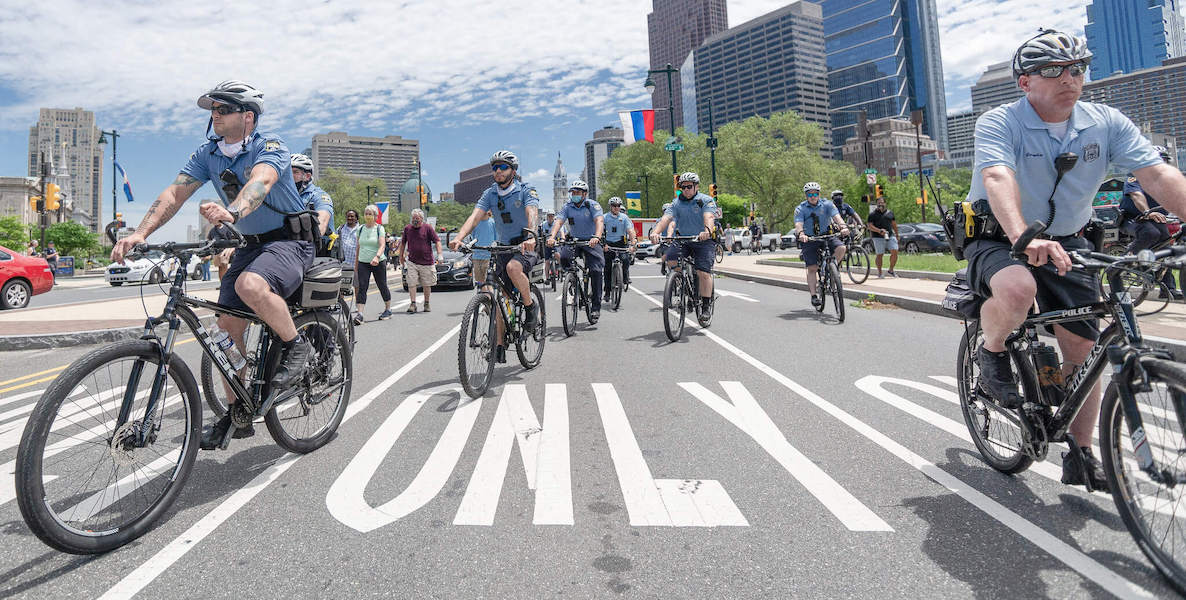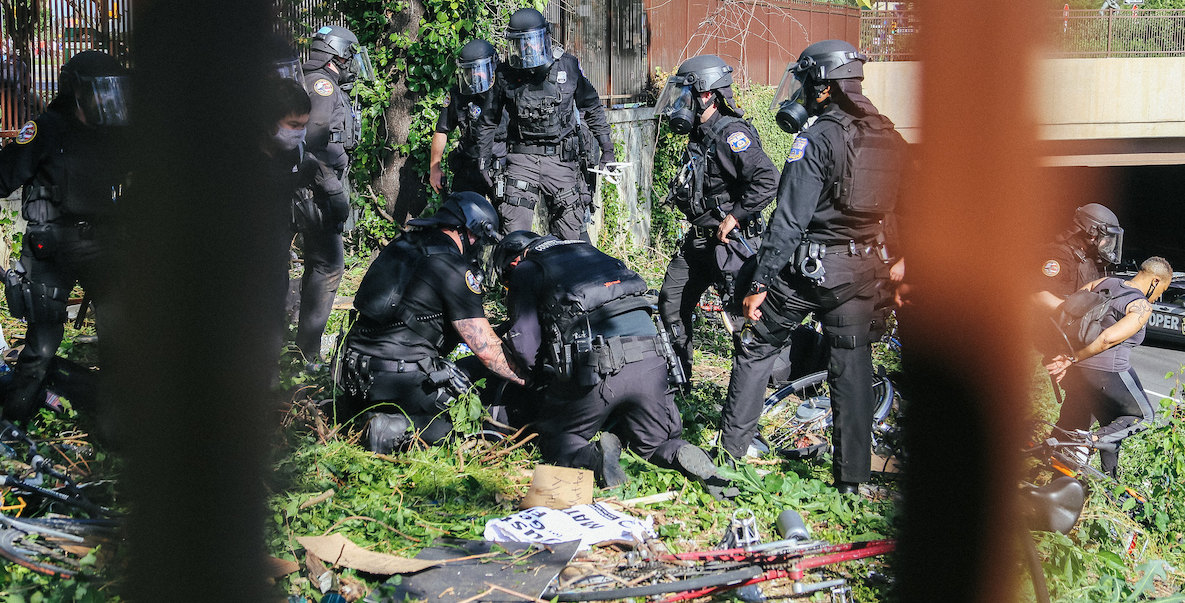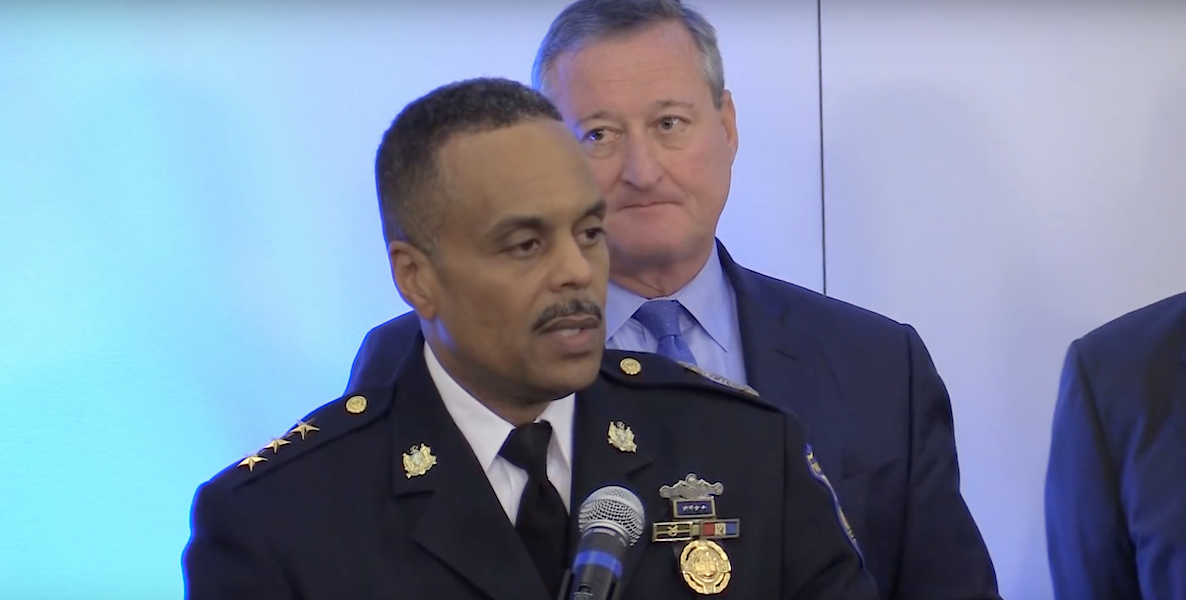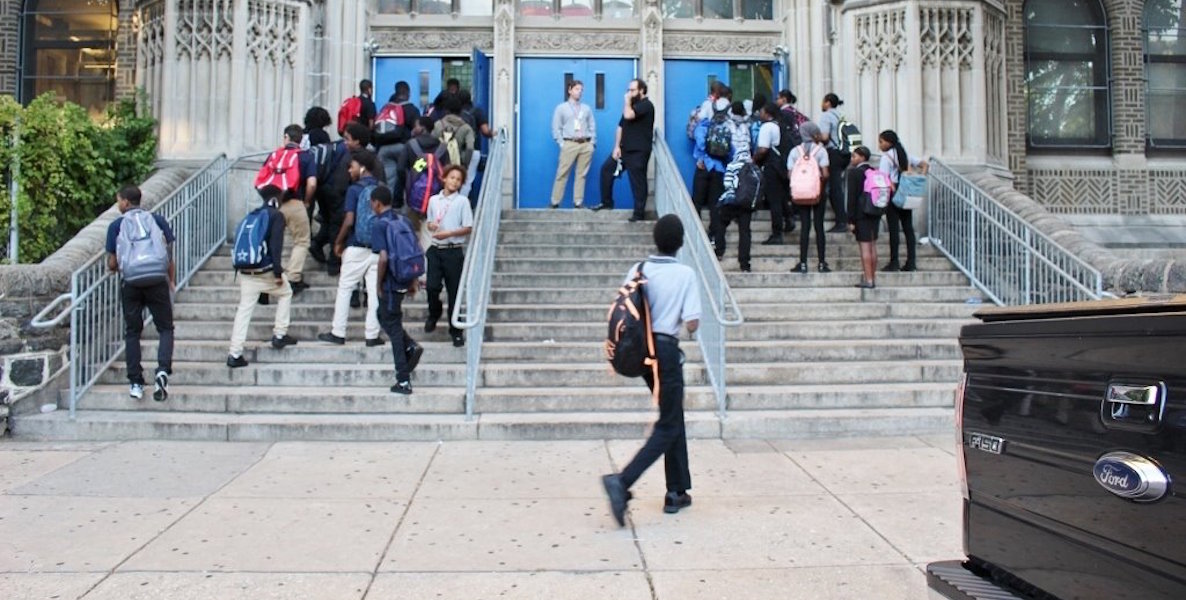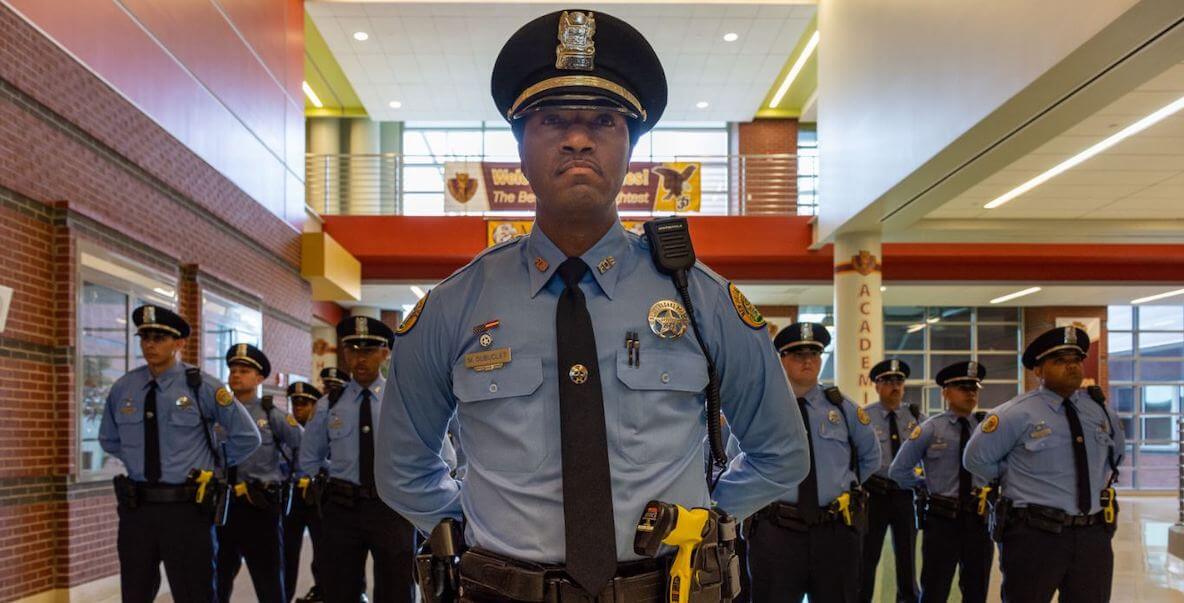When you drive past Lower Merion High School’s campus in Ardmore, you can’t miss the massive stone sign at the entrance along Montgomery Avenue: “Enter to learn, go forth to serve.”

A similar missive — “Enter to learn, leave to serve” — now hangs above the entrance to the training center in Volusia County, Florida, where Philly’s own Mike Chitwood has been the elected sheriff since 2016.
Chitwood is an 18-year veteran of the Philly Police Department, which he joined in the footsteps of his dad, Mike Chitwood Sr., the most decorated officer in Philadelphia history. He says proudly that he stole the slogan from Philly, and he’s committed to it: Soon after his arrival in Volusia County, he cleaned house, brought in new people and signed everyone up for training with the Police Executive Research Forum (PERF).
In 2015, PERF developed a program called ICAT, Integrating Communication Assessment Tactics. It provides first-responding police officers with the tools, skills and options they need to defuse a range of critical incidents, and it focuses on critical thinking, crisis intervention, communications and tactics.
What it doesn’t focus on: perpetuating the warrior mentality that has guided police forces since their inception.
“The [police] union’s screaming — He’s going to get cops killed! We’re warriors! You can’t do this, you can’t do that!” Chitwood recalls. He ignored his critics, and by the end of 2018, he and his whole department went through the training.
And 2019 was a watershed year: When you compare stats from 2016 and 2019, use of force dropped 50 percent. Arrests dropped by nearly 30 percent. Overall crime dropped 40 percent. And, most importantly, injuries against deputies dropped 50 percent.
“When you look at that, you have to say to the union, What’s your argument now? Do you need to be proficient with your firearms? Absolutely, 100 percent. But you also need to be proficient with all of the other tools you can use,” he says. “We’re on to something. We have to continue what we’re doing.”
Inspiration abroad
Chitwood was inspired by a trip to Scotland in 2015, led by PERF Executive Director Chuck Wexler, who’d invited 25 police leaders from around the country to spend one week at Police Scotland’s training academy. No sightseeing or bar-hopping; this would not be a junket to spot the Loch Ness monster.
In Scotland, except for a small special force, police don’t carry firearms. Wexler, who’d collaborated on projects in the U.K. for years, had been continually fascinated by the Scottish approach to de-escalation.
“When someone has a knife in the U.K., the immediate reaction of a constable is to step back. In the U.S, the first thing an officer will do is pull out his gun and aim it at the person,” Wexler says. “But a knife in Detroit and a knife in Glasgow are both knives. That just turned my world upside-down.”
He’s well aware that America has a massive gun problem, which puts police officers in real danger. But he’s also aware of the findings of Pulitzer Prize-winning reporting by The Washington Post, which has found that in 43 percent of fatal police shootings, the suspect didn’t even have a firearm on him or her. There were important applications of the Scottish de-escalation approaches, he believed.
But he wasn’t born yesterday: He knew the only way he could convince American police chiefs to adopt the Scottish mentality was to get them to see it for themselves.
ICAT is based on the work in Scotland and insight from hundreds of police officers around the U.S. More than 80 police and safety institutions around the country currently include it in their training; in Pennsylvania, those departments include Carlisle, and Dickinson College Department of Public Safety—but not Philadelphia.
“Do you need to be proficient with your firearms?” Chitwood says. “Absolutely, 100 percent. But you also need to be proficient with all of the other tools you can use.”
In both of his Florida roles, Chitwood faced skepticism and resistance to introducing ICAT. “We’re America! We lead the world! Why would we look to a country with 6 million people, a national police force, and no gun problem?”
But Chitwood had seen real value, real innovation, during his time in Scotland. Among the strategies Chitwood learned while on the PERF-led trip: Use time and distance; use cover; and communicate, communicate, communicate. And the thing that struck him most: CDM, critical-decision making.
“When they recruit in Scotland, they’re not looking for the best shooter, who can do the most pushups, who can run the fastest mile-and-a half. They’re looking at who has critical-thinking ability,” Chitwood says. “The model is based on ethics, values, proportionality and sanctity of human life.” That, he says, is what really stayed with him. So, too, did the results of a national survey showing that 94 percent of the country had confidence in their police department.
Demand humane policing Do Something
But they hammered home an attitude that affected Chitwood deeply: “Police should have a guardian mentality, not a warrior mentality.” PERF delineates the difference: a focus on “community policing, crime prevention, and high standards of professionalism in policing” versus “high-power weaponry and use of force.”
Chitwood says that as news of George Floyd’s murder made headlines, he was constantly asked what he thought. “The first thing I wanted to do was lunge through the TV screen, knock the officer off of him and say, The man’s saying he can’t breathe, for Chrissake! Sit him up. The second thing that struck me was, Where in God’s name is your empathy?”
He knows ICAT is not a magic bullet: “It’s not a panacea. I know I could be one bad decision away from being a villain.” But it’s progress.
Investing in progress
Comparing Philly to Glasgow or Volusia County, Florida, is in many ways like comparing apples to … grapes. Philly, and its police force, is bigger and more complex than most cities in the world.
But policing in America is at a breaking point, at the same time as violent crime in American cities — including Philly — is on the rise. Calls for change should include investment in the types of training and tactics that lead to more humane policing.
Given his knowledge of Philly — as a citizen and as a law enforcement officer — Chitwood says that for strategies like this to work here, you need union buy-in, you need political support, and you need more funding, not less.
“When someone has a knife in the U.K., the immediate reaction of a constable is to step back. In the U.S, the first thing an officer will do is pull out his gun and aim it at the person,” Wexler says. “But a knife in Detroit and a knife in Glasgow are both knives.”
Consider the math Chitwood is dealing with: He has 1,000 employees and a budget of $94 million. Almost 80 percent of his budget goes to human resources.
This year, in light of Covid-19, $3.5 million is being cut from his budget—all of which was geared towards community outreach, training and technology. It’s the first thing to go because, he insists, you can’t reduce line items like manpower, pension, benefits, gas.
But Chitwood is a creative problem-solver. He has 33 openings on his team and he’s open to converting up to a dozen of them into roles for social workers and mental health professionals to be out on the street with his force.
“You’re not gonna send them by themselves — officers can be with them, out of sight, out of mind, while the mental health workers do their job,” he says, citing how wasteful it can be to send cops to deal with emotional issues. “The other night, we got a call that a 10-year-old threw a plate at his mother and refused to do his homework, and I’m sending two deputies to the house — why? We shouldn’t be doing that.”
He wants to launch a pilot program that would pair social workers with officers to get people resources, not jail time. “Jail is the last place they belong,” he says.
Welcoming change
Of course, these are not the only strategies worth considering. Chris Magnus is the Chief of Police in Tucson, Arizona. His Assistant Chief, Kevin Hall, has led a pre-arrest deflection program so that when, for example, officers encounter individuals with personal-use levels of drugs, they can deflect that person into treatment. “We’re really trying to develop the resources and do some cultural change around the idea that arresting people or chasing them down is a measure of success and should be celebrated. We’ve moved away from that,” Magnus says.
Since the program started, he says they’ve deflected hundreds of people. Tucson Police have also implemented a highly effective and deeply humane approach to mental health.
Closer to home, Camden, N.J., was the focus of a New York Times article last weekend about its progress with the guardian mentality, and is among the agencies that use ICAT. According to The Times, excessive-force complaints in Camden dropped from 65 in 2014 to three in 2019.
And as far back as 2015, The Washington Post reported on the “guardian vs. warrior” training being used in Seattle police training. Signs of change are everywhere.
Philly does train in and employ de-escalation strategies. And Wexler says he could see Philly adopting ICAT. “I know Danielle Outlaw,” he says. “She’s got a lot of things on her plate, but I think she would be open to this.”
For now, there is so much more work to be done.
On police reformRead More
How do we turn things upside-down and say, Okay, we did these things in the past, but everything has to change.”
Photo courtesy Joe Piette / Flickr


